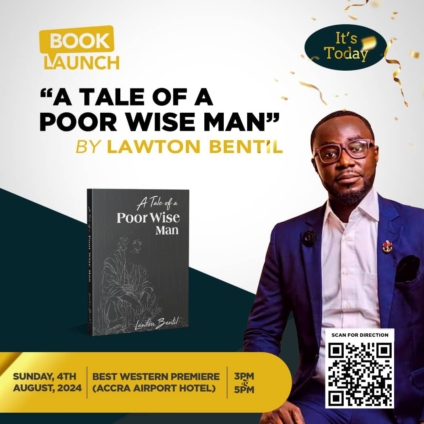Author Lawton Bentil has launched his latest book, "A Tale of a Poor Wise Man," on Sunday, August 4.
This compelling satire delves into the themes of personal leadership and the continent of Africa, offering a poignant commentary on the nature of wisdom and its application.
The book centers around Asiedu, a protagonist endowed with profound wisdom that is evident through the counsel he provides.
However, despite his insightful advice, Asiedu is financially destitute, with three wives, eleven children, and no properties or farmlands.

This paradox serves as a central theme in Mr Bentil’s narrative.
Set in the meticulously fictionalised village of Bibiman—translated to mean "Africa" in English—the story uses this symbolic location to critique a certain type of wisdom prevalent in the continent. Bentil tactically employs Bibiman to denote the geographical setting of this wisdom, which, despite its depth, lacks practical application and tangible results.
The book narrates the story of Bibiman, a city besieged and its inhabitants held captive, which Asiedu saves through his wisdom. However, the subsequent disregard of his counsel underscores a recurring fate for the wisdom of the impoverished.

Mr. Bentil emphasizes that true wisdom is not merely intellectual but should manifest in tangible outcomes, such as financial stability and generational wealth.
In a powerful message to his sons, Asiedu advises, "While you live, make full proof of yourself. Make sure you die empty, make sure you are not called a poor man. Work hard and be consistent at it. Buy lands and properties. Make sure you leave an inheritance for your children's children. Wisdom is good, but wisdom is even better with an inheritance. Learn and be wise. Follow instructions and be honest."
"A Tale of a Poor Wise Man" underscores the unfortunate reality that the wisdom of the socially or economically disadvantaged is often undervalued or ignored. The book ultimately encourages individuals to strive not only for wisdom but also to use it to improve their lives and secure a prosperous future for subsequent generations.
Opanyin Afriyie’s poignant observation, "Nevertheless, the poor man's wisdom is always despised, and his words are not heard," encapsulates the book's core message and serves as a reflective conclusion to this thought-provoking tale.

Lawton Bentil’s new book promises to be an insightful read, blending satire with a deep exploration of wisdom and its real-world implications.
Latest Stories
-
Heavyweight boxing legend George Foreman dies aged 76, says family
21 minutes -
World Cup 2026Q: Lawrence Agyekum makes Black Stars debut in Chad win
2 hours -
No one should be treated as guilty until proven – Deputy A-G on arrest of Kwabena Adu Boahene
4 hours -
‘We will do everything to stay top of Group I’ – Otto Addo
4 hours -
‘I had a good appetite for dinner’ – Mahama on Black Stars’ 5-0 win
4 hours -
High cost of pain: Why physiotherapy remains a luxury for many Ghanaians
4 hours -
2026 FIFA WCQ: Black Stars thrash Chad 5-0 to go top of Group I
5 hours -
Deloitte, Tony Elumelu Foundation strengthen commitment to empower 250,000 African entrepreneurs by 2030
5 hours -
Celebration wasn’t to mock ‘idol’ Ronaldo – Hojlund
5 hours -
Alisson returns to Liverpool after ‘suspected concussion’
5 hours -
ROBB Foundation calls for greater inclusion on World Down Syndrome Day
5 hours -
Photos: Mahama visits Adum fire scene, assesses damage
6 hours -
Muzic Mensah unveils soul-stirring single, ‘Heart Desire’
7 hours -
Could gum disease affect your performance? Experts weigh in
7 hours -
Savannah Regional Minister commends Saha Global for water expansion initiative
8 hours

